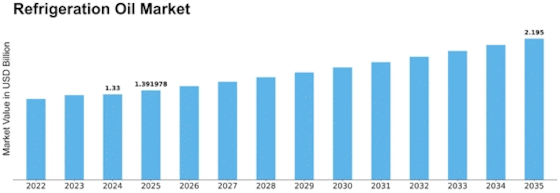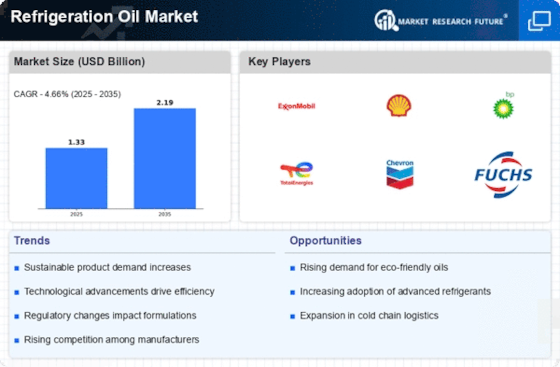Refrigeration Oil Size
Refrigeration Oil Market Growth Projections and Opportunities
The refrigeration oil market is influenced by various market factors that impact supply, demand, and prices of refrigeration oils used in cooling systems. One significant market factor is the growth of the refrigeration and air conditioning industry. As the demand for refrigeration and air conditioning systems increases, so does the demand for refrigeration oils to lubricate and cool these systems. This growth is driven by factors such as urbanization, rising disposable incomes, and changing consumer preferences for comfort and convenience.
Refrigeration oil is majorly used for lubrication of the compressors that help in the production of cold air. The refrigeration oil helps in the reduction of friction between metal parts that diminishes the wearing out of compressors and increasing its life. The refrigeration oil has tolerance towards high temperature, which makes it the best lubricant in the metal industry.
Another important market factor is technological advancements in refrigeration systems. As technology evolves, new refrigeration systems are developed that require specialized refrigeration oils with specific properties. For example, the shift towards more energy-efficient refrigeration systems has led to the development of synthetic refrigeration oils that offer better lubrication and thermal stability, thereby improving the overall efficiency of the systems.
The regulatory environment also plays a significant role in shaping the refrigeration oil market. Governments around the world are implementing stricter regulations aimed at reducing greenhouse gas emissions and phasing out ozone-depleting substances used in refrigeration systems. As a result, there is a growing demand for environmentally friendly refrigeration oils that comply with these regulations. Manufacturers are therefore investing in research and development to formulate refrigeration oils that are not only efficient but also eco-friendly.
Market factors such as fluctuations in crude oil prices and currency exchange rates can also impact the refrigeration oil market. Since refrigeration oils are derived from petroleum-based feedstocks, any fluctuations in crude oil prices can affect the cost of production and ultimately the prices of refrigeration oils. Similarly, fluctuations in currency exchange rates can impact the cost of imported refrigeration oils, especially for countries that rely heavily on imports to meet their demand.
Furthermore, the level of competition in the refrigeration oil market also influences market dynamics. The presence of a large number of manufacturers and suppliers competing for market share can lead to price wars and intense competition. This can benefit consumers by driving down prices, but it can also put pressure on manufacturers to innovate and differentiate their products to stay ahead of the competition.
Lastly, macroeconomic factors such as economic growth, inflation, and consumer spending patterns can impact the demand for refrigeration oils. In periods of economic downturn, consumers and businesses may cut back on spending on non-essential items such as new refrigeration systems or maintenance of existing ones, leading to a decrease in demand for refrigeration oils. Conversely, during periods of economic prosperity, increased consumer spending and investment in infrastructure can boost the demand for refrigeration oils.




















Leave a Comment